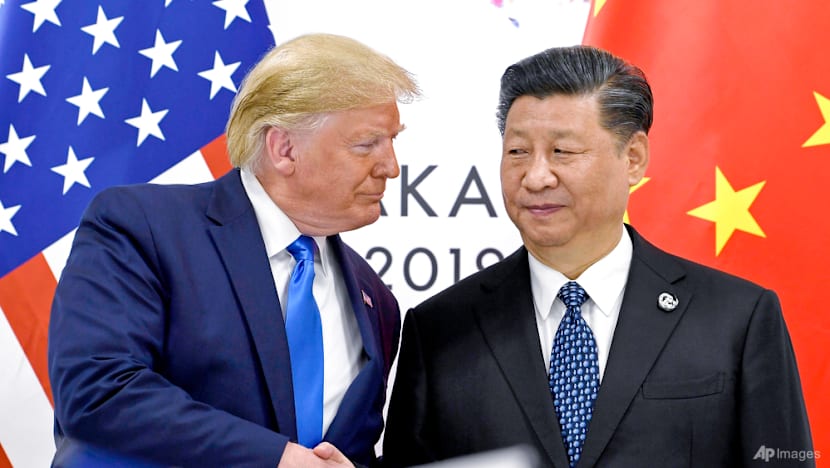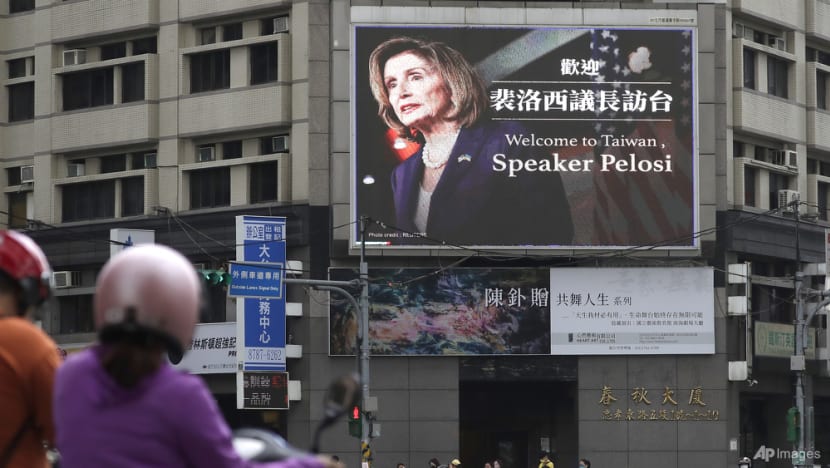Commentary: US-China ties – never mind the trade deal, there are more important issues to resolve
It is better for long-term peace and security that the two superpowers not have an agreement just for the sake of doing so, says veteran newspaper editor Han Fook Kwang.

President Donald Trump, left, shakes hands with China's President Xi Jinping during a meeting on the sidelines of the G-20 summit in Osaka, Japan, Jun 29, 2019. (PHOTO: AP/Susan Walsh)

This audio is generated by an AI tool.
SINGAPORE: I hope there will be no trade deal between the United States and China. This sounds like a death wish but it is better for long-term peace and security that the two superpowers not have an agreement just for the sake of doing so and in the process neglect to resolve their very deep-seated differences.
The way they are dancing towards some form of agreement which will probably be signed at a meeting between the two leaders next year will not make for a lasting settlement.
For US President Donald Trump, it is all about a headline-splashing photo opportunity, and another step towards the Nobel Peace Prize which he craves.
For President Xi Jinping, an agreement will provide some breathing space for China as it continues the relentless march to develop its economy and military, which it believes is vital to secure its future in the face of Western hostility. He is holding out before agreeing to meet Mr Trump to gain as many benefits for China as possible during the negotiations. It isn’t in his interest to agree to a deal at the moment because as long as the meeting hangs in the balance, he has leverage over Mr Trump.
But he has to eventually agree to one to maintain his relationship with the US president and stop it from spinning out of control.
Both leaders are hence only thinking of the short term.
BEST-CASE SCENARIO BUT A BIG "IF"
The best-case scenario is if the deal is framed as a stepping stone towards a longer lasting detente between the two sides.
For this to happen, the two leaders must see it in these terms and work towards the deal, not as an end in itself, but as part of a wider longer-term settlement.
If both countries can see immediate benefits from the deal, the win-win result might spur them to work on their more intractable longer-term issues.
It is a big “if”.
I fear though that neither side is considering such an approach and they are motivated by short-term considerations.
Hence, there is a greater likelihood that if there is a deal now or next year, it will be a repeat of what happened during Mr Trump’s first term in office.
Then, in 2020, the two sides agreed on what was known as a Phase One agreement. Neither country kept to their commitments which included Chinese purchase of up to US$200 billion worth of American goods and a reduction in trade tariffs between the two countries.
As expected, relations nosedived from then to possibly the worst level in living memory.
That’s what happens when you focus on the things that don’t matter and ignore the real problems.
THE REAL ISSUES
What are these?
The US and China face very serious issues that have to be managed over the long term in a sustained and systematic way.
On the economic front, there is a fundamental imbalance in trade relations between the two sides that calls for structural changes, not band aids and grandstanding gestures such as Mr Trump’s reciprocal tariffs.
Cheap Chinese goods that outsell anything and everything that America produces has caused dislocations in US industries resulting in job losses and other social problems.
Americans and Europeans call it overcapacity. The Chinese, and I suspect much of the developing world, wonder why the West, the original capitalist of the free world, can no longer compete fairly and squarely.
Mr Trump’s tariffs will not solve this problem but will make American producers even less competitive and Chinese producers even more so as they look for other markets.
The issue requires structural changes in their economies that are not easy to implement but which they must nevertheless undertake.
This is not about ideology and whether one system is better than another, nor is it a zero-sum game. It is about finding a balance in the global economy that will enable every country to pursue its economic objectives to uplift the lives of its people within an internationally agreed economic order that promotes stability and growth.
The old order has broken down because it could not accommodate the rapid technological and geopolitical changes taking place. New arrangements are needed and it can only happen if the two largest economies agree on the need to do so.
On the military front, there is a renewed arms race between the two superpowers, and among their allies and friends, that is reminiscent of the Cold War.
War may not be inevitable but there is a worrying issue that needs to be tackled immediately, which is the lack of military communication between the two armed forces.
It has grown worse in recent years and requires urgent action.
Military contact at all levels was suspended in 2022 at the height of US-China tension. Though they resumed last year, there have been no sustained communications between the two sides in inherently risky areas including for theatre commanders, in policy coordination and military maritime.
It is untenable for two superpowers armed to the teeth not to talk to each other regularly and find ways to prevent misunderstandings and miscalculations that might lead to inadvertent armed conflict.
The world needs the two sides to hold these military talks more than it needs them to agree to temporary trade agreements that may not ultimately amount to much.

Finally, on the ideological front, the US and China need to come to terms with their differences so that they can co-exist peacefully.
In this respect, Mr Trump has a better chance of succeeding than his Democratic predecessor Joe Biden who foolishly framed it as a battle between democracy and autocracy.
It was a reckless move because it directly challenged the legitimacy of the Chinese regime.
With Mr Trump, who is more transactional and less interested in the other side’s values (as long as they pay their dues), there is a greater chance of the two countries improving their relationship without their ideologies getting in the way.
Which brings me to my final point about the two leaders.
Both are at the height of their political power in their own countries with Mr Trump directing America’s China policy (even if at times there does not appear to be a coherent one) and Mr Xi personally focused on US-China issues which he knows has to be managed for the long term.
Strong leaders are better able to resolve the long-term issues I highlighted above because they require decisive action and forthright leadership.
Both men are in a unique position to do this, provided they are not distracted by relatively unimportant issues that soak up much time and resources.
They should get over the trade and tariff negotiations - with or without a deal - and focus on what really matters.
The fate of the world depends on it.
Han Fook Kwang was a veteran newspaper editor and is a senior fellow at the S Rajaratnam School of International Studies, Nanyang Technological University.



















